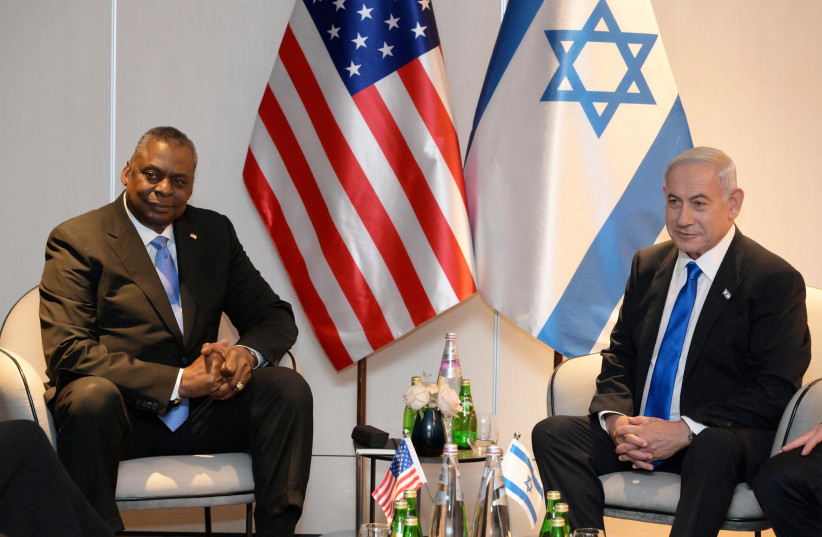US Secretary of Defense Lloyd Austin addressed both US security cooperation and the Israeli government’s judicial overhaul policy at a press conference with Defense Minister Yoav Gallant on Wednesday at Israel Aerospace Industries (IAI) in Lod.
Although Austin took the trouble to mention the US’s “ironclad commitment” to Israel’s security several times, he was also likely the first US secretary of defense to express public concern about internal Israeli judicial branch politics.
Austin’s choice to weigh in on the judicial overhaul issue could be seen within the context of general comments he made about human rights in Egypt and other countries. But it also could be seen within the context of a letter being worked on by US House Appropriations Committee ranking Democrat Rosa DeLauro, asking the US government to “use all diplomatic tools available” to halt the judicial overhaul.
US President Joe Biden, US Secretary of State Antony Blinken and US Ambassador to Israel Thomas Nides have also issued a variety of stark warnings to Israel about the judicial overhaul, but Austin’s area of authority is specifically security issues.
Former senior IDF Intelligence Col. (res.) Eldad Shavit has written in an INSS post that Israel must view US statements on the judicial overhaul issue, taking into account that if the US assessed “that the shared values have been damaged,” this could “have a direct effect on the relations between the two countries – particularly in this sensitive period, when the security challenges, especially on the part of Iran… require a tightening of coordination between the two countries.”

What happened in Austin's meeting with Netanyahu?
Austin said: “I wanted to be here to make something very clear: America’s commitment to Israel’s security is ironclad, and it’s going to stay that way. As President [Joe] Biden said in his visit to Israel last year, ‘The connection between the Israeli people and the American people is bone deep.’ Israel is a major strategic partner for the US.”
But then he continued, “And our bond is rooted in far more than just shared interests. It’s rooted in the shared values of democracy and freedom and the rule of law. And those values remain essential.”
Austin again referred to Biden’s messaging when he said the democracies of Israel and the US “are both built on strong institutions, on checks and balances, and on an independent judiciary.”
The president also noted that building consensus for fundamental changes is really important to ensure that the people buy into them so they can be sustained,” he said, all of which could echo concerns expressed in Shavit’s article and by numerous observers regarding the tone of the criticism on the judicial overhaul issue
In fact, the massive countrywide protests against the judicial overhaul were what forced the press conference to be relocated from the Defense Ministry in Tel Aviv to IAI’s offices.
Gallant focused his remarks on Iran and its nuclear program, saying, “We are in a critical time period; soon we will need to make important, significant and fateful decisions for the State of Israel.”
“Iran is pressing to acquire a nuclear weapon and threatens Israel as well as the entire world,” he said.
“The Iranian threat obligates us to prepare and to be ready for any action – and I reiterate – any action,” he added.
In addition, Gallant talked about the great importance of US-Israeli cooperation regarding Iran, citing the Jewish state’s joining CENTCOM and the two countries’ large joint military exercise, Juniper Oak.
Similarly, Austin said although the Biden administration “continues to believe in diplomacy,” it would “not allow Iran to acquire a nuclear weapon,” adding that America is concerned about the Islamic Republic transferring new battlefield experiences of using its drones in Ukraine to its proxies in the Middle East.
Questioned by The Jerusalem Post about his position on Iran’s enrichment of uranium to the nearly weaponized 84% level, Austin responded that the US was “deeply concerned” but sought to “explore all diplomatic” options to “try to constrain Iran with diplomacy.” At the same time, he said, “my job is to provide the president options” in the military arena, if necessary.
Gallant addressed the Palestinian issue, saying, “Israel has an interest in quiet and well-being for Palestinian civilians throughout Judea, Samaria and Gaza. But at the same time, this will not come at the expense of the security of Israeli citizens. We will act against terror with determination and strength.”
Austin expressed concern about tensions in the West Bank. He supported Israel’s right of self-defense against Palestinian terrorists, but he criticized any violence by Israeli settlers against Palestinian civilians.
Earlier on Thursday, Prime Minister Benjamin Netanyahu said Israel and the US were united to prevent Iran from obtaining a nuclear weapon.
“We have a common agenda to prevent Iran from acquiring nuclear weapons and preventing Iran’s aggression, maintaining the prosperity and security of this region,” he said in a press conference with Austin.
The two countries are working together to “expand the circle of peace,” Netanyahu said.
Austin later commented that the Abraham Accords were facilitating cooperative air defense, early warning systems and maritime security among Israel and its neighbors.
The visit is Austin’s second to Israel as defense secretary, but his first since Netanyahu regained power as prime minister.
Prior to visiting Israel, Austin also visited Jordan, Egypt and Iraq.
